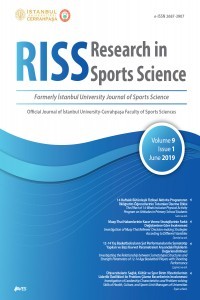İstanbul’da Spor Merkezlerindeki Antrenörlerin Çalışma Koşulları
Bu çalışmada spor merkezlerindeki antrenörlerin çalışma koşulları irdelenmiştir. İstanbul’da toplam 8 spor merkezinde anket uygulanmış, 144 adet anket değerlendirmeye alınmıştır. Anketin yanı sıra 3 kişiyle “Görüşme” yapılmıştır. Çalışma “Betimsel Araştırma” modeline göre tasarlanmış, SPSS programında değerlendirilen verilerin frekans ve çapraz tablo şeklinde sunulması, araştırmanın amacına uygun görülmüştür. Araştırmaya katılan deneklerin toplamda %61,8’inin 19 ile 24 yaş arası kişilerden, geri kalan %38,2’sinin de 25 yaş ve üstü kişilerden oluştuğu görülmektedir(Tablo 1). Deneklerin %59’u erkek, %41’i ise kadınlardan oluşmaktadır(Tablo 2). Deneklerin %45,1’ini BESYO mezunları, %33,3’ünü BESYO öğrencileri, %13,2’sini farklı bir bölüm mezunları, %8,3’ünü ise farklı bir bölüm öğrencileri oluşturmaktadır(Tablo 3). Deneklerin %70,1’ini Fitness Antrenörleri, %0,7’sini uzak doğu sporları antrenörleri, %3,5’ini yüzme antrenörleri, %18,1’ini pilates antrenörleri, %1,4’ünü tenis antrenörleri, %6,3’ünü ise diğer kategorisindeki antrenörler oluşturmaktadır(Tablo 4). Deneklerin %48,6’sı çalışma saatleri içindeki dinlenme molalarını yeterli bulmadığını ifade etmektedir(Tablo 5). Deneklerin %16,7’sı yarı zamanlı; %80,6’sı tam zamanlı biçimde çalıştığı; %46,5’lik bir oranın öğrenci olduğu görülmektedir(Tablo 6). Deneklerin %34’ünün 1201-1600 TL arası, %40,9’un 1601-2000 TL arası, %11,8’inin ise 2001 TL ve üstü gelire sahip olduğu görülmektedir(Tablo 7). Deneklerin %64,5’i mesai saatleri 8 saati aştığı takdirde sadece özel ders verirse gelirine fazladan bir ücret yansıyacağını, %21,5’i gelirine hiçbir şekilde fazladan bir ücret yansımadığını, %13,8’i mesai saatleri 8 saati aştığı takdirde ek ücret verildiğini belirtmektedir(Tablo 8). Deneklerin %45,1’i sigorta primlerinin asgari ücret üstünden, %51,3’üise çalıştığı ücret üstünden yattığını belirtmektedir(Tablo 9). Deneklerden sadece %2,7’si bir işçi sendikasına üye olduğunu, %97,2’lik kısmıysa bir işçi sendikasına üye olmadığını belirtmektedir(Tablo 10). Anahtar Kelimeler: Gelir, Ek ücret, Dinlenme, Özel ders, Mesleki beklenti, Sigorta, Sendika
Investigation of Working Conditions of Coaches in Sports Centers in Istanbul
In this study working conditions of trainers in sport centers have been analysed. Questionnaire was applied in a total of 8 sport centers, 144 of questionnaire were taken to evaluate. In addition to questionnaire an “interview” has been conducted with 3 people. The study is designed according to “descriptive research”, to present data that evaluated in the SPSS program in the form of frequency and cross tables is found acceptable fort he pupose of the research. It is observed that %61,8 in total of subjects attended in the research consist of people between ages of 19 and 24, remaining %38,2 consist of people over the age of 25(Table 1). %59 of subjects consist of males, %41 of consist of females(Table 2). %45,1 of subjects were comprised of SPES (School of physical education and sports), %33,3 students of SPES, %13,2 different department graduates, however %8,3 were comprised of a different department students(Tablo3). %70,1 of subjects were comprised of fitness trainers, %0,7 far east sports triners, %3,5 swimming trainers, %1,4 tennis trainers, %6,3 were comprised of trainers in the other category(Table 4). %48,6 of subjects express that resting breaks in working hours are not enough(Table 5). It is observed that %16,7 of subjects were working part time; % 80,6 in full time format; %46,5 were students. It is observed that %34 of subjects have income between 1201-1600 TL, %40,9 have 1601-2000 TL, %11,8 have income of 2001 TL and higher(Table 7). %64,5 of subjects remark that if working hours exceed 8 hours an extra charge would be reflected in income only if he/she gives private lessons, %21,5 of them remark that in no way an extra charge did not reflect in income, %13,8 of the subjects remark that if working hours exceed 8 hours additional charge was given(Table 8). %45,1 of subjects remark that insurance premium paid over the minimum wage, %51,3 remark that it is paid over running charge(Table 9). Only %2,7 of subjects remark that he/she is a member of a labour union, the other part of %97,2 remark that he/she is not a member of a labour union(Table 10). Key Words: Income, Additional charge, Rest, Private lesson, Occupational expectation, Insurance, Union
- Başlangıç: 2019
- Yayıncı: İstanbul Üniversitesi-Cerrahpaşa
Sayıdaki Diğer Makaleler
Büşra ÖZCAN, Selçuk Bora ÇAVUŞOĞLU
İstanbul’da Spor Merkezlerindeki Antrenörlerin Çalışma Koşulları
Mert Kerem ZELYURT, Muazzez ŞAŞMAZ ATAÇOCUĞU
Basketbol Antrenörlerinin Karizmatik Liderlik Algılarının Değerlendirilmesi
Sporcularda Alt Ekstremite Asimetrisi İle Antrenman Geçmişi Arasındaki İlişki
Berna ERTUĞRUL, Derya ATAMTÜRK, Fırat KOÇ, İzzet DUYAR
Spor Pazarlamasında Spor Sponsorluğu ve Halkla İlişkilerin Önemi
